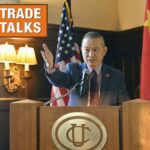A Biden administration would likely improve international trade relations.
Oregon is one of the most trade-dependent states in the country, with one in five jobs dependent on international trade. Nearly 70% of Oregon exports go to China. The Trump administration’s trade war with the trading partner has caused economic pain for industries that ship products overseas.
Oregon cherries, hazelnuts and beef have felt the sting of the trade dispute. The state’s tech companies have also felt pressure to compete with China’s growing semiconductor industry.
In the lead-up to the 2020 presidential election, the Trump campaign characterized Biden as having an overly friendly relationship with China. Maria Ellis, executive director of the Pacific Northwest International Trade Association (PNITA), says a Biden administration’s approach to international trade might differ but warns the international landscape will not return to the way it used to be.
This interview has been edited for length and clarity.
How would a Biden administration be different from the current administration on trade policy?
Trade is sometimes viewed as a zero-sum game, meaning if one trade partner is winning, the other is therefore losing. That has been a hallmark of the current administration, but it has had unintended consequences. This administration has only slightly contributed to lowering our trade deficit while it has cut into employment, productivity and GDP.
Our agriculture business in Oregon is especially dependent on trade. We export 40% of everything we grow here.
What we will see is a more collaborative approach to trade. The good thing about Biden is we have a voting record for him, so we can anticipate what he is going to do as president. He has a relationship with China’s Xi Jinping; but over the past four years China’s growth in power and global influence has changed the landscape.
China’s state-sponsored enterprises can dump goods at much lower prices and make it hard for our companies to compete.
No doubt Biden will continue to address China’s anti-competitive practices surrounding their state-sponsored enterprises and intellectual property rights. It is unclear how many of the tariffs, which have been very painful to both countries, will remain. But I think what we are going to see is a broader set of tools.
What sort of tools would a Biden administration use that would be less harmful to Oregon’s economy?
I think what you will see is a strengthening and recommitment to the World Trade Organization. Trade agreements like the Trans-Pacific Partnership were key to ensuring a level playing field in the Asian market. Biden has also signaled he would use a stick-and-carrot approach, addressing tax policies that allow U.S. multinational firms to shelter their profits in other countries with lower tax rates while also providing incentives for firms that invest in the U.S. and create jobs at home.
We’re likely going to see a more multinational approach by the Biden administration, going with allies to jointly put pressure on China to address its anti-competitive practices.
RELATED STORY: Trade War Pounds Oregon From All Angles
More than half of Oregon exports are sent to the Chinese market. If tariffs are lowered, will we see business improve?
The last four years of the Trump administration has undone some of the United States strategic partnerships. This has allowed China to expand its global reach. The United States, in turn, has become more protectionist. China has long had aspirations to grow its tech sector and its global influence, which accelerated in recent years. It is unclear how much of that business will return.
One of our priorities at PNITA is to invest in our surface transportation and marine transportation system. Biden has plans for a $1.3 trillion, 10-year infrastructure package. This will help support the underlying economies in Oregon and around the country that rely on shipping.
Are there any Biden policies that could affect international trade other than trade agreements?
Biden is proposing $20 billion in broadband infrastructure, which would be huge for us. This would give rural Oregonians access to the wider global market. It’s hard to have a thriving economy statewide if we can’t give our rural communities access to broadband, especially as the world moves toward e-commerce.
The Biden team has signaled for more leadership on clean tech and clean energy, which Oregon is a leader in. Biden has committed to re-joining the Paris Agreement and will pursue clean-tech subsidies in much the same way as the Obama administration. As demand for clean-tech products increases globally, we could see the market for clean energy appliances grow.
One of the biggest areas of Oregon’s tech sector is the semiconductor industry, which Chinese companies have been trying to break into. In order to compete, there needs to be a stimulus package related to research and development. This would spur innovation in the state to keep us on the cutting edge.
Other than China, where could a Biden administration look to strengthen trade agreements?
Vietnam has grown 430% over a nine-year period. Korea also continues to be a growing partnership. Both these countries have benefited from this trade war with China. Developing a good trade agreement with Japan, which is an ally and a trading partner, will also be critical.
Under the new administration, it’s reasonable to expect some companies in Canada to be more interested in building strategic partnerships with the U.S. The last four years left many indicating that doing business in the U.S. is simply too politically volatile.
What other factors will shape international trade going forward?
The elephant in the room here is COVID-19. There were other countries hit hard by this disease, but because many took immediate effective measures early, they aren’t being hit as hard economically. In Korea they had national mandates and shut down immediately. They implemented testing and contract tracing. What we have seen in the U.S. is a prolonged response that has been a drag on our economy.
Creating business opportunities means traveling for meetings. People can’t get on flights across the pond to China or Vietnam. Everything from tourism to growing our market share has been impacted. We won’t be able to get our international economy back on track until we get this pandemic under control.
To subscribe to Oregon Business, click here.








